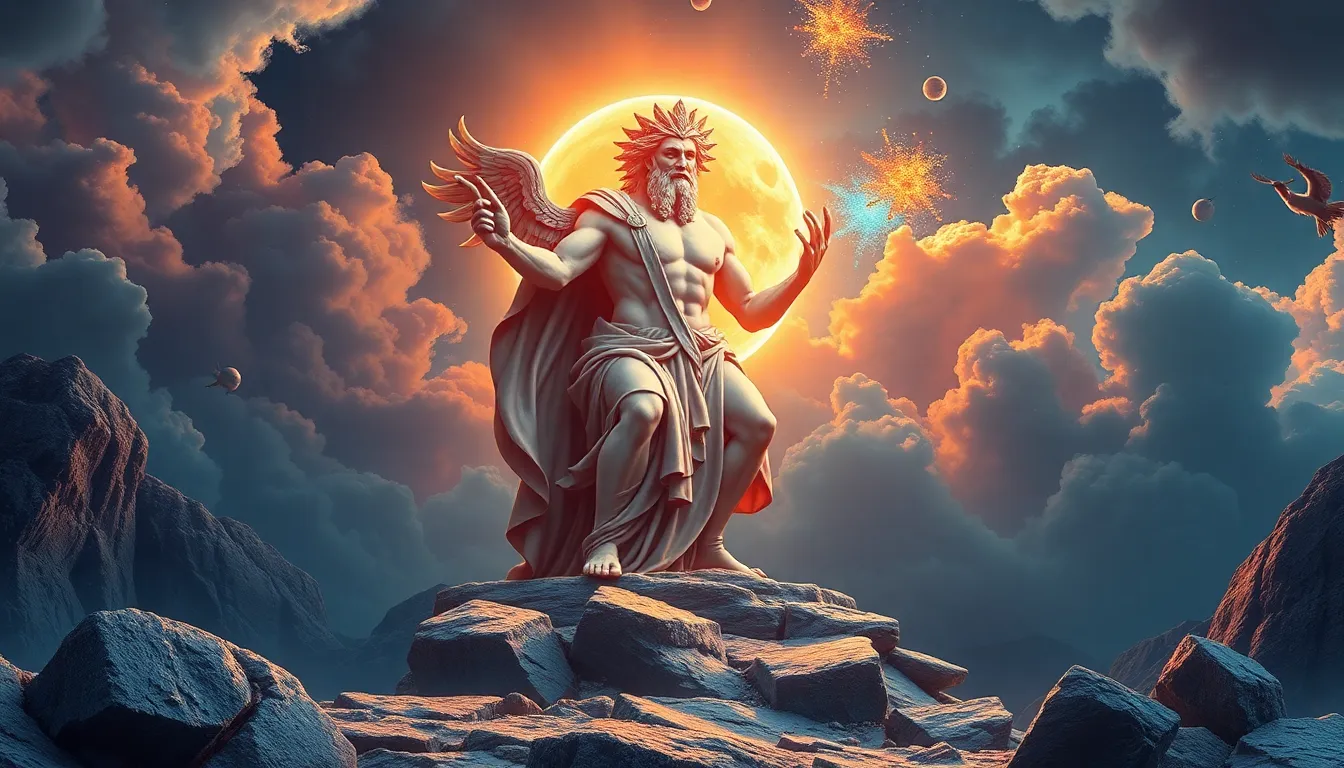The Mythical Legacy of Uranus: How He Influences Modern Culture
I. Introduction
In the vast tapestry of Greek mythology, Uranus stands out as a primordial deity, embodying the sky and the heavens. His narrative intertwines with the creation of the universe, making him a pivotal figure in ancient lore. The celestial figures in mythology, such as Uranus, not only serve to explain natural phenomena but also shape cultural narratives that resonate through the ages.
This article delves into the influence of Uranus on modern culture, exploring his origins, representations in literature and art, symbolism, and the broader implications of his myth in contemporary society.
II. The Origins of Uranus: A Mythical Figure
Uranus, often depicted as the personification of the sky, is a significant figure in Greek mythology. He is described as the son and husband of Gaia, the Earth. Together, they birthed several generations of deities, most notably the Titans, who played crucial roles in various mythological tales.
His role in the creation myth is profound; Uranus’s union with Gaia resulted in the creation of not only the Titans but also the Cyclopes and the Hecatoncheires. However, his tyranny and oppressive nature led to a fateful rebellion by his son, Cronus, who castrated him, leading to Uranus’s downfall.
The cultural significance of Uranus in ancient civilizations is evident in how the Greeks viewed the cosmos. As a fundamental aspect of their cosmology, Uranus represented the unbounded sky, which was integral to their understanding of the universe.
III. Uranus in Literature and Art
The legacy of Uranus extends into literature and art, where he has been depicted in various forms over the centuries.
- Classical Literature: Uranus appears in works such as Hesiod’s “Theogony,” which outlines the origins of the gods and the universe. His narrative serves as a foundation for understanding the lineage of divine beings.
- Renaissance Art: During the Renaissance, artists like Raphael and Michelangelo drew inspiration from classical mythology, integrating figures like Uranus into their works, symbolizing divine authority and the celestial order.
- Modern Adaptations: In contemporary literature, Uranus is sometimes reinterpreted to explore themes of rebellion and transformation, resonating with modern audiences.
IV. The Symbolism of Uranus
Uranus is imbued with rich symbolism, often associated with themes of chaos, innovation, and rebellion.
- Chaos: His violent separation from Gaia signifies the chaos that precedes creation, a theme prevalent in many cultural narratives.
- Innovation: As a figure representing the heavens, Uranus embodies the spirit of innovation, pushing boundaries and challenging the status quo.
- Rebellion: The rebellion against Uranus by Cronus symbolizes the fight against tyranny, a theme that resonates with many modern cultural movements.
These themes are echoed in contemporary cultural movements, where the quest for change and transformation mirrors Uranus’s narrative, making him a potent symbol for those seeking to challenge established norms.
V. Uranus in Astrology and Popular Culture
In astrology, Uranus is regarded as a planet of individuality, innovation, and sudden change. Its astrological significance is profound, influencing the way people perceive their identities and destinies.
- Astrological Significance: Uranus is associated with the sign of Aquarius, symbolizing humanitarianism, progress, and rebellion against conformity.
- Impact on Modern Astrology: The influence of Uranus in astrological practices encourages individuals to embrace their uniqueness and pursue unconventional paths.
- Representation in Popular Culture: Uranus’s themes are reflected in various forms of media, including films, music, and fashion, often celebrating individuality and progressive ideals.
VI. The Influence of Uranus in Science and Technology
The discovery of the planet Uranus in 1781 marked a significant milestone in astronomy, expanding humanity’s understanding of the solar system.
- Scientific Implications: Uranus was the first planet discovered with a telescope, leading to advancements in observational astronomy and inspiring future explorations of the cosmos.
- Mythology and Science: The name Uranus, derived from the Greek god, serves as a reminder of the interconnectedness of mythology and scientific discovery, inspiring scientists to explore the unknown.
- Innovation and Technology: The themes associated with Uranus—transformation and innovation—are pivotal in the field of technology, encouraging advancements that challenge the conventional.
VII. Uranus and Social Movements
The themes represented by Uranus resonate strongly with various social movements advocating for progressive change.
- Connection to Social Change: The rebellion against Uranus symbolizes the struggle against oppressive forces, mirroring the fight for justice and equality in modern society.
- Case Studies:
- LGBTQ+ Rights: Activists often draw upon the spirit of Uranus to advocate for individuality and the right to love freely.
- Environmental Movements: Uranus’s association with change and transformation aligns with the urgent call for environmental reform and sustainability.
- Enduring Legacy: The influence of Uranus continues to inspire those advocating for societal reform, embodying the spirit of resistance against the status quo.
VIII. Conclusion
Uranus’s multifaceted influence on modern culture is evident across various domains, from literature and art to social movements and scientific exploration. His legacy transcends time, illustrating the profound connection between mythology and contemporary narratives.
The ongoing relevance of mythical legacies like that of Uranus reminds us of the importance of these stories in shaping modern identity and culture. As society continues to evolve, the themes of chaos, innovation, and rebellion associated with Uranus will undoubtedly remain significant in the quest for understanding and progress.




